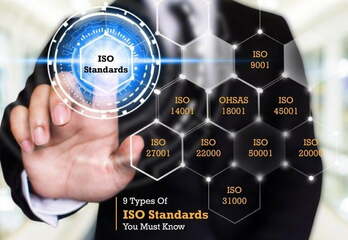

In the highly competitive business environment, quality is one of the great “weapons” of survival and perhaps the best “secret” for the rapid development of any business. Especially for countries, which face great international competition from other countries with low production costs, upgrading the quality of the products produced and the services provided is imperative.
The implementation of a Management System by a Company has now become a key success factor. A Management System is the set of actions that a business plans, documents and implements at all operational levels in order to achieve compliance with the requirements of either a standard, customers or legislation. The business determines a way of operating, with which it considers that it achieves its goals (in quality, environmental protection, hygiene, etc.) and which it follows systematically and consistently, keeping evidence of its implementation.
The first Management System to appear in the business world was the Quality System (based on the ISO 9001 standard), which
specifies how to ensure the quality of the services and products provided. The international standard ISO 9001 is widely accepted throughout the world for ensuring the quality of the products and services provided. The ISO 9001 standard includes the criteria (requirements) that businesses must meet to ensure the quality of the products produced and the services provided. The standard is written in the form of “must”, that is, it defines what businesses must do to ensure and improve the quality of their products and services and ultimately receive a certificate of compliance with the standard. The implementation of the standard is optional, but it is a powerful tool for organizing and promoting in the market for a business.
PROSPERITY LTD, with many years of experience, undertakes the study and development of a Quality Management System, which is then implemented by the interested company under the guidance of PROSPERITY LTD consultants. The Quality Management System meets the requirements of the International Standard ISO 9001. The correct implementation of the System and the compliance with the requirements of the standard is audited by an independent Certification Body, which issues a certificate of conformity.
We should emphasize at this point that PROSPERITY LTD does not simply carry out studies, but provides its clients with the know-how to design, implement and maintain a Quality Management System. This means in simple words that PROSPERITY LTD trains the staff of Businesses/Organizations on the requirements of the ISO 9001 standard and gives them the know how to use the tools it will provide them (Manuals, procedures, forms, Instructions, software, applications, etc.).
The time needed for the preparation and installation of a Quality Management System until certification ranges from 6 to 12 months depending on the readiness of the company concerned.
The ISO 9001 standard promotes the adoption of a process approach when a Quality Management System is developed, implemented and its effectiveness is improved, in order to increase customer satisfaction. A process can be considered an activity that uses resources and is managed to enable the conversion of inputs into outputs.
Quality Management Systems have a specific philosophy. A Quality Management System is not something that copies the criteria of the standard. ISO 9001 states what is necessary in a quality system but does not give details on how this will be met. Thus, for each company, a separate interpretation of the standard must be made based on the needs and specificities of the company. The system must be adapted to the company (to its administrative and organizational structure) and not the company to the System that comes ready to use.
The quality system must operate in such a way as to provide confidence that:
1. the system is understandable and effective,
2. the products or services actually meet customer expectations,
3. the emphasis is placed on preventing problems rather than relying on identifying them after they occur.
Great emphasis should be placed on the importance of the marketing and design departments, as being particularly important for:
1. identifying and defining customer needs and expectations and product requirements,
2. providing ideas and designs for producing products or services with specified specifications at the best cost.
In order to organize a well-structured and effective Quality Management System, emphasis should be placed on identifying actual or potential quality problems and introducing corrective or preventive measures.
Business Management must define the quality factors that affect the company's position in the market and the objectives related to new products, processes, technologies or services, in order to allocate the company's resources based on a time schedule.
All written procedures must be documented simply, clearly and understandably and must indicate the methods to be used and the criteria to be met.